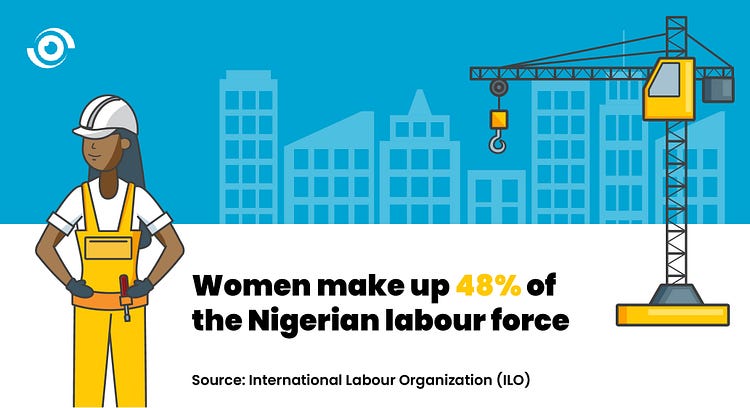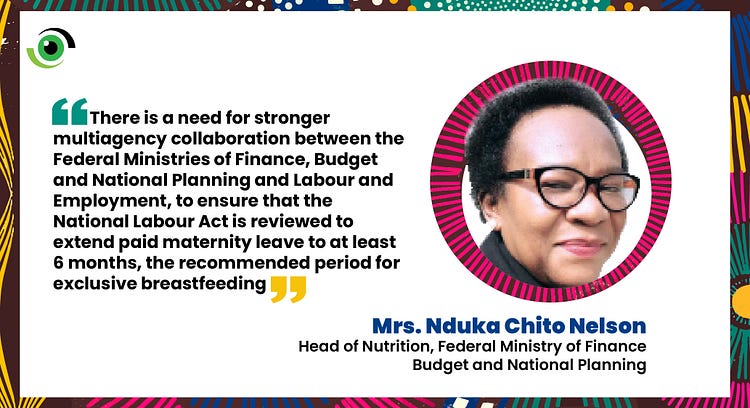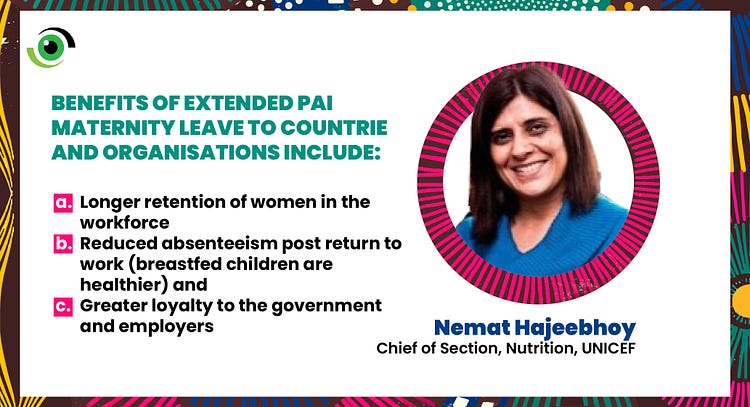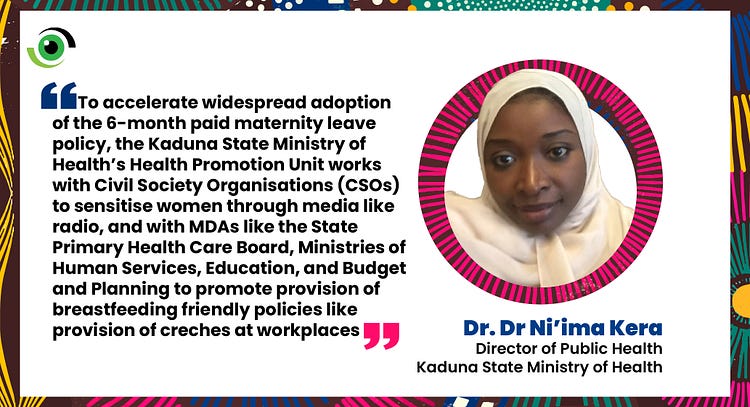Breastfeeding provides essential nutrients to newborns and infants, which translate to proper growth and development from childhood to adulthood. There are many benefits to breastfeeding for both infants and mothers. These include, a reduced risk of infections, heart disease, obesity and others, for the infant and a reduced risk of breast and ovarian cancers, heart disease, etc., for the mother. It also has future economic benefits for countries. Avoidable illnesses and deaths resulting from not breastfeeding incurs global costs as high as $1.1 billion annually to treat.
Despite all these benefits, this Alive and Thrive report states that Nigeria has attained a mere 24% rate of exclusive breastfeeding as of 2017, far below the global target of 50% by 2025 set by the World Health Assembly (WHA). According to the International Labour Organisation (ILO), women make up 48% of the Nigerian labour force. With the significant contributions that women make to the country’s economic growth as well as the proven benefits of breastfeeding to infants, mothers and countries, it is imperative that workplaces provide an enabling environment for women to thrive in the workplace. These include sustained implementation of breastfeeding-friendly policies, such as extended paid maternity leave, flexible work hours, provision of lactating rooms and creches, etc.

For the 2021 World Breastfeeding Week (#WBW 2021), the Nigeria Health Watch policy dialogue tagged “Strengthening Workplace Policies for Exclusive Breastfeeding: A Shared Responsibility” discussed existing workplace policies for exclusive breastfeeding. The aim of the policy dialogue is to increase public awareness and discourse on the importance of stronger policies, including contributions to the bottom line of organisations and other components of Infant and Young Child Feeding (IYCF). The event was moderated by Dara Ajala-Damisa, Programme Manager at Nigeria Health Watch.
Multisectoral Coordination of Nutrition Programmes
Speaking at the policy dialogue, Mrs Nduka Chito Nelson, Head of Nutrition at the Federal Ministry of Finance, Budget and National Planning (FMFBNP), discussed existing national legislation, policy and coordination frameworks for nutrition programmes. The National Policy on Food and Nutrition highlights the importance of the first 1,000 days of life (from conception until a child is 2 years old) with clear strategies for exclusive breastfeeding. These strategies are included in the 5-year National Multisectoral Plan of Action for Food and Nutrition and are being budgeted for in the Nigeria’s Medium-Term National Development Plan. With strong multisectoral coordination and synergy, the National Committee on Food and Nutrition and the National Council on Nutrition (chaired by the Vice President of Nigeria) oversee implementation of the strategies, while fostering shared learning and support of breastfeeding and nutrition policies across organisations. Subnational level coordination is done through existing structures like the state committees on food and nutrition who ensure implementation of the strategies at state levels.

She however highlighted the need for stronger multiagency collaboration, such as between the FMFBNP and the Federal Ministry of Labour and Employment, particularly in ensuring that the National Labour Act is reviewed to extend paid maternity leave to at least six months, the recommended period for exclusive breastfeeding.
Advocating for Stronger Breastfeeding Protection Policies
Nemat Hajeebhoy, Chief of Section, Nutrition at UNICEF, spoke to the advocacy efforts of UNICEF in ensuring stronger breastfeeding protection policies, including early initiation of breastfeeding within one hour of birth, six months of exclusive breastfeeding, followed by up to 24 months of continued breastfeeding with complementary feeding. She highlighted three key barriers that have been encountered in advocating for longer paid maternity leave of up to six months as well as other workplace interventions to enable women to continue to breastfeed for up to 24 months in Nigeria:

- Women’s belief that taking extended maternity leave will hamper their opportunities for career advancement.
- Policy makers’ notion that extended paid maternity leave will negatively affect the employment rate of women in the workforce.
- Private sector resistance to bearing the burden of paying female staff during extended maternity leave periods.
In addressing these barriers, UNICEF has highlighted the benefits of extended paid maternity leave to countries and organisations, including longer retention of women in the workforce, reduced absenteeism post return to work and greater loyalty to government and employers. Advocacy efforts targeted at beneficiaries (women themselves) have highlighted that taking six months off per child, which comes to a total of two years for four children, out of an average of 35 cumulative years of contribution to the workforce is unlikely to hamper their career growth, and how stronger policies ultimately translate to increased productivity for them.
The Kaduna State Case Study
Kaduna state amended its maternity leave policy to six months of paid maternity leave in 2019. According to Dr Ni’ima Kera, Director of Public Health at the Kaduna State Ministry of Health, following the announcement of the new policy, implementation commenced with continuous communication with the Heads of Ministries, Departments and Agencies (MDAs) of the State and the Head of Civil Service, to ensure adoption and compliance across board. This policy is about to be institutionalised as an executive bill which should make private sector compliance faster. The bill is currently being reviewed by the State Ministry of Justice.

To accelerate widespread adoption, the Health Promotion Unit in the Kaduna State Ministry of Health works with Civil Society Organisations (CSOs) to sensitise women through mainstream media like radio, as well as with MDAs like the State Primary Health Care Board, Ministries of Human Services and Social Development, Education, and Budget and Planning to promote provision of breastfeeding friendly policies like provision of creches at workplaces. Advocacy to these organisations is hinged on the proven contributions of these policies to the growth of the organisation, including staff retention, increased productivity and staff loyalty.
Call to Action
Key takeaway points from the policy dialogue include:
- Protecting breastfeeding should be everyone’s responsibility not just the mothers, as it benefits the whole of society.
- Make breastfeeding the new normal. Employers can do better, for example by providing flexible work options and at least 10 square meters of space for breastfeeding mothers.
- It is everyone’s responsibility to ensure full implementation of the revised IYCF policy at all levels.
To close the policy dialogue, Vivianne Ihekweazu, Managing Director, Nigeria Health Watch reiterated the importance of an all of society approach in ensuring that breastfeeding protection policies are adopted across public and private sectors in Nigeria.



It’s useful not only to mothers and I pray both public and private organizations would take note, especially in the area of paid maternal leave and enabling environment for breastfeeding mothers.
Exclusive breast feeding and women which plays a great role in it’s accomplishment is what should be seriously considered.
I agree with the suggestion that paid maternal leave should be considerable extended till 6 months to enable the possibilities of exclusive breast feeding.
Nice write up. In my view, the singular most impactful measure to fostering 6- months of exclusive breastfeeding is government policy of extended paid maternity leave. This is what I feel wonen advocacy groups, CSOs should focus on achieving rather than mouthing women equality!.
By the way, I noticed mention of Kaduna state case study of 2019.?. Are we aware of the fact that this policy of 6 months extended paid maternity leave has been a state policy since the second tenure of Ex- Governor Babatunde Raji Fashola. He in fact also instituted the policy of paid 10 days paternity leave for the father of a new born in public service. As an Obstetrician/Gynaecologist, I reckoned this was one of the most progressive government policies I’ve seen in the country with wide- ranging family/societal socio- economic implications.
In essence, as a country and as a people we have to decide what is important to us and what comes first!.
The 2-years prescribed and now promoted by UNICEF and other health organizations have been prescribed about 1443 years ago by the Creator of man( Holy Quran).
Best regards & keep the flag flying Nigeria healthwatch.